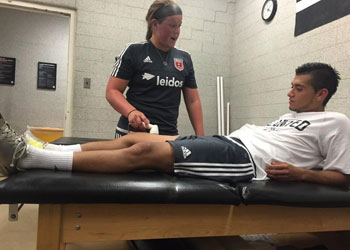
Athletic training major Kyley Mickle had a challenging new internship this summer – she’s the only woman on the athletic training staff at the Major League Soccer team D.C. United.
It hasn’t been easy. The senior noted that players often flock to the male staff for treatments and tapings.
“I have had to work harder to gain the players’ trust that I can effectively employ these methods just as the other staff can,” Mickle said.
Instead of getting frustrated, she approaches the challenge as an opportunity. “It sort of lit a fire under me to outwardly show my confidence in my abilities, which is something that I have struggled with in the past,” she said
Although she says she has struggled with showing confidence, Mickle, who is from Port Allegany, has a lot to be proud of. Last summer she was an intern at the extreme sports camp Camp Woodward (usually only rising seniors are hired as interns). She was asked to return to Woodward this year and comes highly recommended by both her Pitt-Bradford professors and high school teachers. She cites her recommendations and networking skills as the keys to successfully securing the internship at D.C. United.
Through this internship Mickle is being exposed to the best of the best in athletic training. As you might imagine, a professional team’s training program looks a lot different than the program at Camp Woodward, or even the program at Pitt-Bradford.
“D.C. United has massage therapists who come in daily,” Mickle said. She went on to list all the elements of a professional athletic training program: “A team chiropractor, a team acupuncturist, a laser therapy unit… (electronic muscle stimulation) and ultrasound units, a full weight room…the list goes on and on.”
The team even has something called an AlterG treadmill, which Mickle explains is a treadmill “that can decrease the amount of gravity pulling you to the Earth so that you can run or walk without having to bear your full body weight.”
Obviously being at D.C. United is an incredible opportunity. Mickle is getting to experience the best equipment and work alongside world-class trainers, but with such an opportunity comes a lot of pressure. When a sport is someone’s livelihood, making sure players are healthy and injury free is even more important. Players get frustrated if a treatment isn’t working as well or as quickly as they hoped. They question trainers’ skill and treatment plan.
And then there’s the internal pressure. “Knowing that your treatments, rehabs and decisions can determine the future of your athletes’ careers can make you work that much harder in providing the best care that you can for them,” Mickle says.
How does she handle the stress? She embraces it. She challenges herself to be confident. She keeps up with her responsibilities, which range from performing ultrasound treatments, massages and neuromuscular stimulation to racing onto the field in between drills with water to keep players hydrated. And she learns as much as she can. For example, at D.C. United, trainers use an evidence-based approach.
In this approach, it is important to be familiar with the current research in the field of athletic training. “It is one thing to conduct your rehab protocols and tapings directly from textbook methods, but it is another thing to read up on what methods actually have the most benefits,” Mickle explains.
Mickle’s mentors have encouraged her to keep up to date with research in the field by seeking out and studying research articles. “Kyle Sherry and Gabriel Manoel, the assistant athletic trainer and physical therapist, respectively, have preached … about reading research article after research article. I have a collection of close to 15 articles in my notebook from them,” she says.
It is good practice for her upcoming capstone research paper. She’s been considering several different ideas for that, like discussing the titanium bracelets many baseball players wear or, she says, “doing a Mythbusters-type paper about chocolate milk being a good post-recovery drink.”
When she returns to Pitt-Bradford in the fall, Mickle will have a lot to share with her classmates in the athletic training program. She has seen techniques they’ve studied in lecture actually practiced on professional athletes. Pitt-Bradford’s program prepared her for the challenges of her internship, and now, the program will benefit from her experience with a professional team.
ORIGINAL ARTICLE:
http://www.upb.pitt.edu/templates/Beyond.aspx?menu_id=250&id=35206